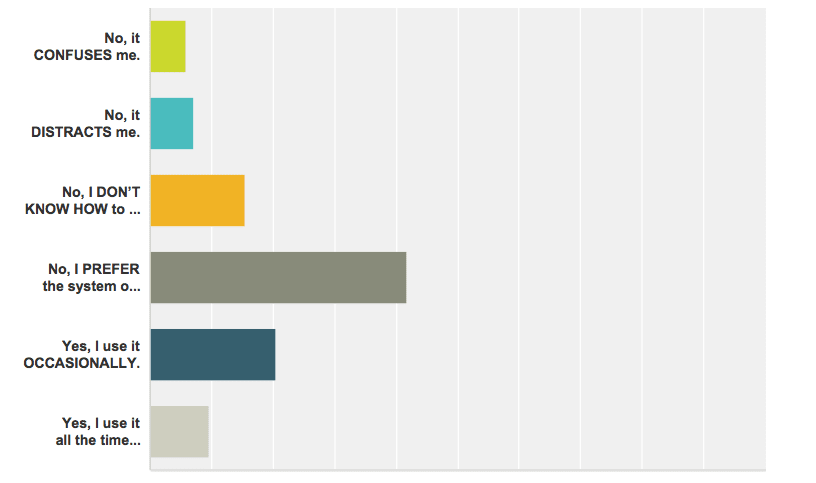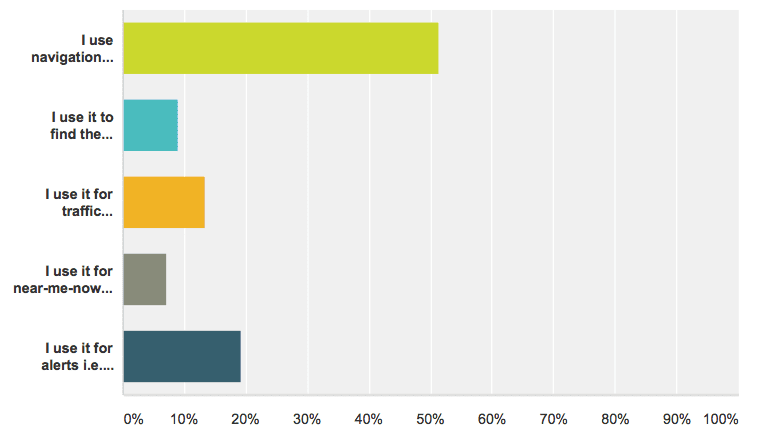Today, deCarta released a study highlighting the views of 150 U.S. car owners on the topic of safety concerns and the connected car. The industry spends a great deal of time talking about all of the great outcomes of having more connectivity and applications available in the car, but what about the potential for a decrease in the safety of the car occupants due to these distractions?
deCarta considered these questions from the navigation point of view. And some of the answers might be surprising to you. The survey begins with a question about the use of navigation services in the vehicle and what types are used. Almost 42% of users said they prefer to use their smartphone navigation features as opposed to the on-board functionality offered by their car’s head unit. That is a lot of people trying to pay attention to a very small non-integrated device while maneuvering a fast-moving vehicle through traffic. I have to say this was a worrying statistic to me.
The study found that the group using the on-board system said it was primarily for simple navigation features: How do I get from point A to point B? Not for the more advanced features of looking for fuel locations or shopping and restaurants along their route. What would have been interesting to understand is whether their on-board systems didn’t offer this level of functionality or if they were unaware it existed or didn’t know how to use it.
Within this group the navigation was used mainly for “when I get lost.” This was a surprise as it seems there are many people whom I know who always have it turned on with directions, even if they know where they are going, to ensure they are rerouted if a traffic issue happens. I wonder if this is an age/location related interest? Especially since this functionality was rated as the main reason to use on-board tools by more than 60% of the respondents.
When asked what the biggest issue was related to on-board navigation usage being a more common occurrence, it was related to the functionality when going through an area without wireless coverage. Again, more than 60% of respondents said this needed to be resolved to increase adoption.
There was a great deal of concern across the survey pool about potential driver distraction in the connected car. The main topics related to content-and navigation-based distraction are as follows and all were expressed by over 50% of respondents:
- Drivers distracted by looking down at mapping apps rather than at the road.
- Drivers trying to manage multiple, different applications for local search and mapping while behind the wheel.
- Drivers focusing on nondriving features such as videos or other online content while driving.
Almost 70% of the respondents feel that head units that display infotainment-type content in addition to navigation and car-related functionality were dangerous. This really makes you think about the level of adoption of these services even when they are available in models to come. Although the feeling was just as high that if these systems could be voice activated and not require as much visual and tactile interaction with the screen, the safety would be greatly enhanced. I spoke with J. Kim Fennell, CEO of deCarta about the survey, and he said these were the two measurements that he felt were the most surprising. More specifically, that so many respondents found these options dangerous and felt that voice would help reduce that danger.
Keep in mind that this is a small survey in a single country, but there are trends to be noticed here. It would be great to be able to look at the answers given by geography and age group to see if there were differences driven by these factors. The entire set of results can be found at this link.
Like what you read? Follow me on twitter!
Claudia Bacco, Managing Director – EMEA for RCR Wireless News, has spent her entire career in telecom, IT and security. Having experience as an operator, software and hardware vendor and as a well-known industry analyst, she has many opinions on the market. She’ll be sharing those opinions along with ongoing trend analysis for RCR Wireless News.

